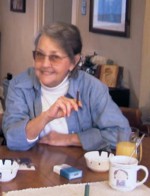Ex anti-roker betoont spijt
Nadat in Canada enkele jaren geleden een voormalige anti-roker om ethische redenen de beweging verliet werd er deze week een nieuw geval bekend van een wetenschappelijk onderzoeker op het gebied van meeroken die spijt betuigt van de opstelling van de anti-rokenbeweging en haar opstelling tegenover tegenstanders.
Op een Blog neemt de onderzoeker van de Boston University School of Public Health afstand van de anti-rokenbeweging waar hij zo lang deel van uitmaakte. In zijn bijdrage beschrijft hij de beperkte visie die anti-rokers aan de dag stellen waarbij ze elke tegenstander van de anti-rokenpolitiek kenschetsen als pionnen van de tabaksindustrie. Zelfs karaktermoorden worden daarbij niet geschuwd, aldus Michael Siegel.
A prime example of this perspective is a November 2001 article published in the American Journal of Public Health, entitled “Junking Science to Promote Tobacco.” The abstract of the article makes it clear that the paper’s purpose is to discuss “the ways the tobacco industry has created controversy about risk assessment and about the scientific evidence of the health hazards of secondhand smoke.” Note that the article is about how the tobacco industry undermines the science.
In a section titled “Distorting Risk,” the paper states: “There are many groups and consultants who were funded by the industry, both directly and through subsidiary companies, and who provided the tobacco industry with ample material, in the form of testimony, reports, and other publications, to fight tobacco policy and regulations.” One such individual mentioned in the section is Martha Perske. According to the article: “In February 2001, on the Web site JunkScience.com, Martha Perske provided a critique of studies linking passive smoking and lung cancer. In the article, she grossly misstates the WHO’s work in this field. Perske has no formal scientific training and her one publication in the peer-reviewed literature is a letter to the editor—which appeared, incidentally, in the journal edited by Alvan Feinstein. She describes herself as a “smokers’ advocate,” but industry documents show that she stayed in close contact with Philip Morris, asking for their review of and comments on her activities.”
One such individual mentioned in the section is Martha Perske. According to the article: “In February 2001, on the Web site JunkScience.com, Martha Perske provided a critique of studies linking passive smoking and lung cancer. In the article, she grossly misstates the WHO’s work in this field. Perske has no formal scientific training and her one publication in the peer-reviewed literature is a letter to the editor—which appeared, incidentally, in the journal edited by Alvan Feinstein. She describes herself as a “smokers’ advocate,” but industry documents show that she stayed in close contact with Philip Morris, asking for their review of and comments on her activities.”
Without a doubt in my mind, this article is attempting to malign the character of Martha Perske by claiming that she is, in fact, simply an arm of the tobacco industry – an example of an individual who the tobacco industry is using to do its work for it. By the context in which this attack appears, it clearly, in my mind, construes to the reader that Perske is part of the tobacco industry’s effort to undermine science, and more specifically, that she is affiliated with the industry. The paper even cites tobacco industry documents in an attempt to support its claim.
[…]
There’s just one problem.
Martha Perske has nothing to do with the tobacco industry. She is not affiliated with the industry. She has not received money from the industry. She is a private citizen who happens to have devoted a significant portion of her “free-time” to what she perceives as a pursuit to promote policy that accords with her interpretation of the scientific facts (albeit an interpretation that differs from most in the tobacco control movement).
I have known Ms. Perske for the past 10 years, over which time we have corresponded, both in writing and by telephone, many times about some quite sophisicated issues related to the interpretation of epidemiologic studies relating secondhand smoke to lung cancer risk. During my time as a public servant at CDC, Ms. Perske was one of the most intelligent, insightful, and engaged citizens who I served, even though she disagreed with my own scientific work and subsequently published one of the most scathing (and scientifically meticulous and insightful) critiques of my work.


